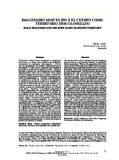Mostrar el registro sencillo del ítem
Imaginario masculino y el cuerpo como territorio descolonizado
| dc.rights.license | http://creativecommons.org/licenses/by-nc-sa/3.0/ve/ | es_VE |
| dc.contributor.author | Terán, Carol | |
| dc.date.accessioned | 2023-12-07T15:04:35Z | |
| dc.date.available | 2023-12-07T15:04:35Z | |
| dc.date.issued | 2023-12-07 | |
| dc.identifier.issn | 0798-1570 | |
| dc.identifier.uri | http://www.saber.ula.ve/handle/123456789/50049 | |
| dc.description.abstract | El presente estudio busca interpretar el imaginario masculino y el cuerpo como territorio descolonizado, asumiendo las siguientes interrogantes ¿Cuáles son los imaginarios del hombre latinoamericano y venezolano? ¿Cuáles son los arquetipos del imaginario masculino y su ejercicio de poder en el otro? ¿Cómo se presenta el proceso de descolonización en el hombre latinoamericano? Para ello se desarrollo como corpus teórico el Imaginario masculino, el cuerpo y el poder, los arquetipos del pensamiento del hombre latinoamericano. Desde lo metodológico se describe conceptualmente la realidad que se percibe a través de los sentidos y se interpreta, puesto que la teoría no es definitiva y es reflejo de la historicidad del ser, ya que muchas cosas están por encima de nuestra capacidad de percibir los cambios. Se aplica el racionamiento intuitivo y el enfoque socio crítico – dialectico, es descriptiva, aplicando la facultad cognoscitiva del ser humano de interpretar. La investigación teórica asume una vía intuitiva de la realidad y de los datos que aportan los diferentes autores relacionado con el tema a desarrollar, de esta manera llegar a la teorización posterior. Teniendo en cuenta el interaccionismo simbólico, se puede señalar el contexto espacio temporal de los actores el hombre latinoamericano y su imaginario masculino, así como la descolonización del cuerpo para poder comprender los significados construidos (Martínez, 2009), ya que las significaciones que damos a nuestras conductas individuales proceden de la interpretación que se hace de la interacción social. Asimismo es como intervienen significados y símbolos; estos son los que construyen la realidad individual y colectiva, que solo puede explicarse a partir de dicha interacción y en la cual la comunicación juega un papel principal porque es a través de ella que se produce socialmente el sentido. Recibido: Septiembre-2022 / Aceptado: Octubre-2022 | es_VE |
| dc.language.iso | es | es_VE |
| dc.publisher | SaberULA | es_VE |
| dc.rights | info:eu-repo/semantics/openAccess | es_VE |
| dc.subject | Cuerpo | es_VE |
| dc.subject | Imaginario | es_VE |
| dc.subject | Imaginario masculino | es_VE |
| dc.subject | Territorio descolonizado | es_VE |
| dc.subject | Descolonización | es_VE |
| dc.title | Imaginario masculino y el cuerpo como territorio descolonizado | es_VE |
| dc.title.alternative | Male imaginary and the body as decolonized territory | es_VE |
| dc.type | info:eu-repo/semantics/article | es_VE |
| dc.description.abstract1 | The present study seeks to interpret the male imaginary and the body as a decolonized territory, assuming the following questions: What are the imaginaries of the Latin American and Venezuelan man? What are the archetypes of the masculine imagination and their exercise of power in the other? How is the decolonization process presented to Latin American men? For this purpose, the masculine Imaginary, the body and power, the archetypes of the thought of the Latin American man, were developed as a theoretical corpus. From the methodological point of view, the reality that is perceived through the senses and is interpreted is conceptually described, since the theory is not definitive and is a reflection of the historicity of the being, since many things are above our ability to perceive changes. Intuitive rationing and the socio-critical - dialectical approach are applied, it is descriptive, applying the cognitive faculty of the human being to interpret. Theoretical research assumes an intuitive path of reality and the data provided by the different authors related to the topic to be developed, in this way reaching subsequent theorization. Taking into account symbolic interactionism, we can point out the spatio-temporal context of the actors, the Latin American man and his masculine imaginary, as well as the decolonization of the body in order to understand the constructed meanings (Martínez, 2009), since the meanings that we give to Our individual behaviors come from the interpretation that is made of social interaction. This is also how meanings and symbols intervene; These are the ones that build individual and collective reality, which can only be explained from said interaction and in which communication plays a main role because it is through it that meaning is socially produced. | es_VE |
| dc.description.colacion | 31-46 | es_VE |
| dc.description.email | cifranueva@ula.ve | es_VE |
| dc.description.email | carolterang@gmail.com | es_VE |
| dc.description.frecuencia | Semestral | |
| dc.description.paginaweb | http://www.saber.ula.ve/cifranueva | |
| dc.identifier.depositolegal | P P92-0047 | |
| dc.identifier.edepositolegal | ppi 201202ME4019 | |
| dc.identifier.eissn | 2244-8438 | |
| dc.publisher.pais | Venezuela | es_VE |
| dc.subject.institucion | Universidad de Los Andes | es_VE |
| dc.subject.keywords | Body | es_VE |
| dc.subject.keywords | Imaginary | es_VE |
| dc.subject.keywords | Masculine imaginary | es_VE |
| dc.subject.keywords | Decolonized territory | es_VE |
| dc.subject.keywords | Decolonization | es_VE |
| dc.subject.seccion | Revista Cifra Nueva: Artículos | es_VE |
| dc.subject.tipo | Artículos | es_VE |
| dc.type.media | Texto | es_VE |
| dc.contributor.orcid | https://orcid.org/0000-0003-3387-8111 |
Ficheros en el ítem
Este ítem aparece en la(s) siguiente(s) colección(ones)
-
Cifra Nueva - Nº 048
Julio-Diciembre 2023


